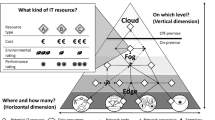Abstract
Manufacturing scheduling has a crucial role in a company's performance. It’s a hard optimization problem and due to the latest manufacturing trends, it is becoming even more complex. Metaheuristics are promising methods to solve those real-world problems. The latest distributed/parallel computing advances may support the increase of computational power needed to get efficient schedules a suitable time period. In the last years, the Industrial Internet has also known some advances as the emergence of the Edge computing paradigm that increased the computational processing power near the factory floor. This work presents strategies to implement a distributed metaheuristic for manufacturing scheduling on the Edge. Under the scheduling problem context, the physical platform and the programming environment are examined. Based on an evolutionary metaheuristic (genetic algorithm), a model is developed, following strategies that take advantage of the Edge layer of the Industrial Internet. The generic algorithm steps are described for future deployment and validation.
Access this chapter
Tax calculation will be finalised at checkout
Purchases are for personal use only
Similar content being viewed by others
References
Framinan, J.M., Leisten, R., García, R.R.: Manufacturing Scheduling Systems: An Integrated View on Models, Methods and Tools. Springer, London (2014). https://doi.org/10.1007/978-1-4471-6272-8
Sokolov, B., Dolgui, A., Ivanov, D.: Scheduling in Industry 4.0 and Cloud Manufacturing (2020). https://doi.org/10.1007/978-3-030-43177-8
Garey, M.R., Johnson, D.S., Sethi, R.: Complexity of flowshop and jobshop scheduling. Math. Oper. Res. 1, 117–129 (1976). https://doi.org/10.1287/moor.1.2.117
Pinedo, M.L.: Scheduling Theory, Algorithms, and Systems. 5th edn. Springer International Publishing, Cham (2016). https://doi.org/10.1007/978-3-319-26580-3
Coelho, P., Silva, C.: Parallel Metaheuristics for shop scheduling: enabling industry 4.0. Procedia Comput. Sci. 180, 778–786 (2021). https://doi.org/10.1016/j.procs.2021.01.328
Liu, Y., Wang, L., Xu, X., Zhang, L., Wang, X.V.: Industrial internet for manufacturing. Robot. Comput. Integr. Manuf. 70, 102135 (2021). https://doi.org/10.1016/j.rcim.2021.102135
Wang, J., Xu, C., Zhang, J., Bao, J., Zhong, R.: A collaborative architecture of the industrial internet platform for manufacturing systems. Robot. Comput. Integr. Manuf. 61, (2020). https://doi.org/10.1016/j.rcim.2019.101854
Coelho, P., Pinto, A., Moniz, S., Silva, C.: Thirty years of flexible job-shop scheduling: a bibliometric study. Procedia Comput. Sci. 180, 787–796 (2021). https://doi.org/10.1016/j.procs.2021.01.329
Morell, J.Á., Alba, E.: Running genetic algorithms in the edge: a first analysis. In: Herrera, F., et al. (eds.) CAEPIA 2018. LNCS (LNAI), vol. 11160, pp. 251–261. Springer, Cham (2018). https://doi.org/10.1007/978-3-030-00374-6_24
Harada, T., Alba, E.: Parallel genetic algorithms: a useful survey. ACM Comput. Surv. 53, (2020). https://doi.org/10.1145/3400031
Talbi, E.-G.: Metaheuristics: From Design to Implementation. John Wiley & Sons, Hoboken (2009). https://doi.org/10.1002/9780470496916
Gong, Y.J., et al.: Distributed evolutionary algorithms and their models: a survey of the state-of-the-art. Appl. Soft Comput. J. 34, 286–300 (2015). https://doi.org/10.1016/j.asoc.2015.04.061
Rossit, D.A., Tohmé, F., Frutos, M.: Industry 4.0: smart scheduling. Int. J. Prod. Res. 57, 3802–3813 (2019). https://doi.org/10.1080/00207543.2018.1504248.
Zhang, J., Ding, G., Zou, Y., Qin, S., Fu, J.: Review of job shop scheduling research and its new perspectives under Industry 4.0. J. Intell. Manuf. 30(4), 1809–1830 (2017). https://doi.org/10.1007/s10845-017-1350-2
Rossit, D., Tohmé, F.: Scheduling research contributions to Smart manufacturing. Manuf. Lett. 15, 111–114 (2018). https://doi.org/10.1016/j.mfglet.2017.12.005
Zhang, T., Li, Y., Philip Chen, C.L.: Edge computing and its role in Industrial Internet: methodologies, applications, and future directions. Inf. Sci. (Ny) 557, 34–65 (2021). https://doi.org/10.1016/j.ins.2020.12.021
Capra, M., Peloso, R., Masera, G., Roch, M.R., Martina, M.: Edge computing: a survey on the hardware requirements in the Internet of Things world. Futur. Internet. 11, 1–25 (2019). https://doi.org/10.3390/fi11040100
Gómez, A., et al.: Use of single board computers as smart sensors in the manufacturing industry. Procedia Eng. 132, 153–159 (2015). https://doi.org/10.1016/j.proeng.2015.12.461
Goldberg, D.E.: Genetic Algorithms. Pearson Education India. Springer, London (2006). https://doi.org/10.1007/978-1-4471-0903-7_7
Gendreau, M., Potvin, J.-Y.: Handbook of Metaheuristics. Springer, Boston (2010). https://doi.org/10.1007/978-1-4419-1665-5
Acknowledgements
This research is sponsored by FEDER funds through the program COMPETE – Programa Operacional Factores de Competitividade – and by national funds through FCT – Fundação para a Ciência e a Tecnologia –, under the project UIDB/00285/2020 and the doctoral grant to Pedro Coelho (SFRH/BD/129714/2017).
Author information
Authors and Affiliations
Corresponding author
Editor information
Editors and Affiliations
Rights and permissions
Copyright information
© 2021 IFIP International Federation for Information Processing
About this paper
Cite this paper
Coelho, P., Silva, C. (2021). A Distributed Model for Manufacturing Scheduling: Approaching the EDGE. In: Dolgui, A., Bernard, A., Lemoine, D., von Cieminski, G., Romero, D. (eds) Advances in Production Management Systems. Artificial Intelligence for Sustainable and Resilient Production Systems. APMS 2021. IFIP Advances in Information and Communication Technology, vol 630. Springer, Cham. https://doi.org/10.1007/978-3-030-85874-2_44
Download citation
DOI: https://doi.org/10.1007/978-3-030-85874-2_44
Published:
Publisher Name: Springer, Cham
Print ISBN: 978-3-030-85873-5
Online ISBN: 978-3-030-85874-2
eBook Packages: Computer ScienceComputer Science (R0)




